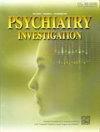焦虑/抑郁在听觉幻觉与精神分裂症患者洞察力之间的中介作用
IF 1.8
4区 医学
Q3 PSYCHIATRY
引用次数: 0
摘要
目的 听觉言语幻觉(AVH)是精神分裂症的一个突出症状,会给患者带来极大的痛苦。幻听对洞察力的影响似乎错综复杂,并取决于其他伴随症状。本研究调查了 AVH 与洞察力之间的关系和可能的中介因素。研究使用量表对幻觉体验、洞察力水平和其他精神病理学进行评估。变量之间的复杂关系被设想为一个路径模型,其初始结构是通过高斯图形模型构建的。结构方程模型验证了最终模型的有效性。为了增强模型的稳健性,对自我报告数据和临床医生评分数据分别进行了分析。相反,情绪困扰越严重,洞察力越强。这些关系仅在自我报告的结果中表现明显,并没有反映在临床医生评定的结果中。路径模型表明,积极与消极综合征量表(PANSS)的焦虑/抑郁因子是连接所发现的关联的重要中介。值得注意的是,PANSS 阴性症状对 PANSS 焦虑/抑郁因子和洞察力的影响恰恰相反,因此很难界定其总体影响。负性症状对焦虑/抑郁所起的中介作用是澄清这种错综复杂关系的一个有价值的概念。本文章由计算机程序翻译,如有差异,请以英文原文为准。
The Mediating Role of Anxiety/Depression Between Auditory Verbal Hallucinations and the Level of Insight in Schizophrenia
Objective Auditory verbal hallucination (AVH) is a prominent symptom of schizophrenia causing profound distress. The influence of AVHs on insight appears to be intricate and contingent on other accompanying symptoms. This study investigated the relationship and possible mediators between AVHs and the degree of insight.Methods One hundred patients with schizophrenia participated in the study. Scales were used to evaluate the hallucinatory experience, the level of insight and other psychopathology. Complex relationships between variables were envisaged as a path model, whose initial structure was constructed via Gaussian Graphical Model. The validity of the final model was verified by Structural Equation Modeling. Separate analyses were performed for self-reported and clinician-rated data to enhance the model’s robustness.Results The greater the severity of the physical aspects of AVHs, the lower the level of insight observed. Conversely, higher emotional distress was associated with increased insight. These relationships were only evident in the self-reported results and were not reflected in the clinician-rated results. The path model suggested that the Positive and Negative Syndrome Scale (PANSS) anxiety/depression factor was an important mediator that linked the found association. Notably, the PANSS negative symptom had the opposite effect on the PANSS anxiety/depression factor and insight, making it difficult to define its overall effect.Conclusion The findings of this study provided one possible route for the positive influence of AVH experience in gaining insight. The mediating role of anxiety/depression modified by negative symptoms emerged as a valuable concept for clarifying this intricate relationship.
求助全文
通过发布文献求助,成功后即可免费获取论文全文。
去求助
来源期刊

Psychiatry Investigation
PSYCHIATRY-
CiteScore
4.10
自引率
3.70%
发文量
105
审稿时长
6-12 weeks
期刊介绍:
The Psychiatry Investigation is published on the 25th day of every month in English by the Korean Neuropsychiatric Association (KNPA). The Journal covers the whole range of psychiatry and neuroscience. Both basic and clinical contributions are encouraged from all disciplines and research areas relevant to the pathophysiology and management of neuropsychiatric disorders and symptoms, as well as researches related to cross cultural psychiatry and ethnic issues in psychiatry. The Journal publishes editorials, review articles, original articles, brief reports, viewpoints and correspondences. All research articles are peer reviewed. Contributions are accepted for publication on the condition that their substance has not been published or submitted for publication elsewhere. Authors submitting papers to the Journal (serially or otherwise) with a common theme or using data derived from the same sample (or a subset thereof) must send details of all relevant previous publications and simultaneous submissions. The Journal is not responsible for statements made by contributors. Material in the Journal does not necessarily reflect the views of the Editor or of the KNPA. Manuscripts accepted for publication are copy-edited to improve readability and to ensure conformity with house style.
 求助内容:
求助内容: 应助结果提醒方式:
应助结果提醒方式:


